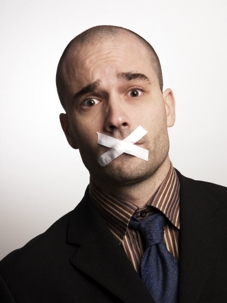US Supreme Court Justice Robert H. Jackson is known for many things. He was appointed chief prosecutor of the Nazi war criminals at the Nuremberg trials. He joined the majority and helped defeat racial segregation in schools in the case of Brown v. the Board of Education. However, he is also known for one very astute observation which he stated in the case of Watts v. Indiana: “any lawyer worth his salt will tell the suspect in no uncertain terms to make no statement to police under any circumstances.”
The right to remain silent and to not make statements to the police have been a current theme of my associate attorney, David Zwanetz, in a number of videos which he has put online through either the Shapiro Zwanetz & Lake (SZL) newsletters or webpage. Interestingly, Prosecutors have argued against the advice that David has offered in the past, namely, keep your mouth shut and invoke your constitutional rights to remain silent. Most recently, prosecutors have won a significant victory in scaling back these rights.
In the case of Salinas v. Texas, Mr. Salinas was being questioned by the police. However, he was not under arrest. Because he was technically free to leave the questioning at any time, Miranda warnings were not issued nor were they required under the law. When certain questions were asked of Mr. Salinas, he decided to remain silent. Eventually, evidence was acquired by the police allowing them to charge Mr. Salinas with the investigated crime.
During the trial Mr. Salinas, the state sought to rely heavily on Mr. Salinas’s silence, inferring that only a guilty person would remain silent during a police investigation where one was not in custody. This issue was appealed to the United States Supreme Court. In a 5 – 4 opinion, the Court indicated that before one can rely on the constitutional privilege against self-incrimination he is required to specifically invoke it. Since Mr. Salinas remain silent, instead of expressly invoking his right against self-incrimination, the prosecution could use his silence as evidence of his guilt.
As a result of the Salinas opinion, the police may use a driver’s silence in DUI cases as evidence of their guilt. For example, if an officer asks the driver if he had been drinking, or how much he had to drink, or if he would participate in field sobriety tests, and the driver merely remains silent, his silence can be held against. Further as a result of the Salinas opinion, it is my opinion that my clients would be best served by not answering any of the police questioning other than saying something as follows: “ Since I am unsure of my rights, I refuse to make a statement (or to perform any fields of variety tests; or to take a breath test: etc.) without first speaking with my attorney.” it is my belief that such a statement would preclude the state from using any “silence” against the accused. Should a judge disagree and rule that such a statement is admissible, it could be explained away that the accused was not indicating he would not talk; only that he would not talk until first consulting with his attorney, thereby exercising his constitutional right to counsel.
Recently, I had the opportunity to speak with a former union president of one of the local police unions, and now a retired police officer. He indicated to me that he loved David Zwanetz’s videos and he thought that the advice offered regarding remaining silent was very apropos. He indicated that when he was the police union president, he told all of his officers that they were not to make any statements to any investigators from the Internal Affairs Division without first speaking with a lawyer. Thus, when the police are accused, they remain silent until they are able to speak with their counsel. Certainly the police should then not be surprised when a suspect seeks the same constitutional protections.
There is nothing wrong with an informed citizenry, knowing their rights and exercising their rights. The attorneys at Shapiro Zwanetz & Lake (SZL) offer these insights, not to foment illegality, but to encourage an intelligent dialogue regarding what one should do if they are the subject of a police investigation. I applaud David Zwanetz for producing these videos; and I applaud our clients, witnesses, friends, and followers on social media to become more informed citizens and to understand their rights.

